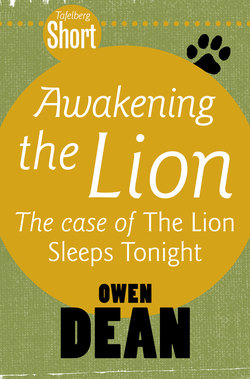Читать книгу Tafelberg Short: Awakening the Lion - Owen Dean - Страница 3
На сайте Литреса книга снята с продажи.
ОглавлениеDiscovering the lion
There was nothing about 2 September 2002 that outwardly suggested it was going to be anything but a conventional day in my life. It was a normal spring day in Pretoria, bright and sunny, without being too hot. The trees in the city were already heralding the approach of spring and there were signs of their boughs budding with green.
I was an attorney and partner at Spoor & Fisher, one of the leading specialist intellectual property law firms in the country. This field of law comprises patents, trademarks, copyright and designs. I had been specialising in trademark and copyright law for the past 28 years and become known as ‘Mr Copyright’.
I was sitting in my office waiting for a client named Geoff Paynter of Gallo Africa, one of the principal music companies in South Africa. It was part of a group of companies that also comprised Nu Metro Films and various other entities in the entertainment industry. Geoff Paynter was the person at Gallo who was primarily involved in copyright matters, especially the commercial exploitation of music, as distinct from recorded music. Gallo was a major client of mine and I had acted for them in several matters, including in connection with music rights, sound recordings and the distribution of movies in the home entertainment market.
I hadn’t been told what Geoff wanted to talk to me about, but I had an inkling; I had half been expecting him to see me about it for some time. This went back to a consultation I had had with him some two years earlier, in June 2000, when he had raised a very interesting matter and sought a formal opinion from me on behalf of his company.
It related to the rights in a song called Mbube, which had evolved over a period of several years into an international hit called The Lion Sleeps Tonight and become one of the most successful pop songs ever written and performed. After several visits to the international hit parade in various guises, it had been taken up into the world famous musical production The Lion King, which had enjoyed long and successful runs on Broadway, London’s West End and other parts of the world. The stage show, the animated movie version of its story and its music had been produced by Walt Disney of the United States.
Two years before, Geoff had brought me a suitcase full of documents that represented everything Gallo had on file about the song Mbube. He had also handed me a copy of an article entitled ‘In The Jungle’ by Rian Malan, an investigative journalist and writer who had made a name for himself by writing controversial articles, often of a political nature. The article, published in the US magazine Rolling Stone of 25 May 2000, related the sad tale of the composer of Mbube, Solomon Linda (also known as Ntsele), and his family.
The main thrust of Malan’s article was that although Solomon Linda had written Mbube, which had gone on to achieve great things and generate bounteous riches, none of these riches had accrued to the composer or his family, who all lived a life of poverty. The article sketched how the song had developed as a commercial property and how it had been the subject of commercial and legal wrangles between various other parties. But all of this had passed Solomon Linda and his family by; he had simply passed into oblivion.
The article said it was grossly unfair that the original composer of the song and his family should have lived such impoverished lives while the song was a passport to riches for others, mainly the moguls of the music industry in the United States. The plight of the composer and his family was attributed at least in part to the Apartheid system and the second-class status suffered by black people in South Africa at the time.
Gallo, the initial usurper of the song from Solomon Linda, had given it a start along its successful road and participated in the benefits. In fact, Gallo was cast somewhat in the role of villain in what had befallen Solomon Linda and his family. And it wasn’t enjoying being portrayed in this light, particularly in the ‘new’ South Africa where it had become part of a corporate group with a strong black empowerment orientation. The purpose of that earlier visit of Geoff’s had been to commission me to investigate the legal situation surrounding the rights to the song, and to find out whether anything could be done to reinstate the claim of the Linda family to the song and improve their material lot.
In short, Gallo was politically embarrassed by the position Rian Malan’s article had highlighted, and wanted me to find some way for it to redeem itself, particularly in the eyes of the public.
I had undertaken the task of ploughing through myriad documents, mostly contracts entered into over the years in connection with the song. I had pieced together the relevant facts and legal issues in the hope that I would miraculously find that Gallo and/or the Linda family could claim some rights in the song which would lead them to the pot of gold. It had been a daunting task. I had spent many hours sifting through all the documents and at the end of it all I had produced a lengthy written opinion for Gallo. The position I had arrived at was an interesting one – and one that surprised everyone, including me.
